11 start with W start with W

Success in war ultimately depends on the consolidation of political order. Nadia Schadlow argues that the steps needed to consolidate a new political order are not separate from war. They are instead an essential component of war and victory.
The challenge of governance operations did not start with the wars in Iraq and Afghanistan. The US Army’s involvement in the political and economic reconstruction of states has been central to all its armed conflicts from large-scale conventional wars to so-called irregular or counterinsurgency wars. Yet, US policymakers and military leaders have failed to institutionalize lessons on how to consolidate combat gains into desired political outcomes. War and the Art of Governance examines fifteen historical cases of US Army military interventions, from the Mexican War through the wars in Iraq and Afghanistan. Improving future outcomes will require US policymakers and military leaders to accept that plans, timelines, and resources must be shaped to reflect this reality before they intervene in a conflict, not after things go wrong.
Schadlow provides clear lessons for students and scholars of security studies and military history, as well as for policymakers and the military personnel who will be involved in the next foreign intervention.
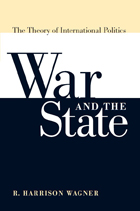
War and the State exposes the invalid arguments employed in the unproductive debate about Realism among international relations scholars, as well as the common fallacy of sharply distinguishing between conflict among states and conflict within them. As R. Harrison Wagner demonstrates, any understanding of international politics must be part of a more general study of the relationship between political order and organized violence everywhere--as it was in the intellectual tradition from which modern-day Realism was derived. War and the State draws on the insights from Wagner's distinguished career to create an elegantly crafted essay accessible to both students and scholars.
"Possibly the most important book on international relations theory since Kenneth Waltz's Theory of International Politics."
---James Fearon, Stanford University
"This is one of the best books on international relations theory I have read in a very long time. It is required reading for any student of modern IR theory. Once again, Wagner has shown himself to be one of the clearest thinkers in the field today."
---Robert Powell, Robson Professor of Political Science, University of California, Berkeley
"Painting on a vast canvas, and tackling and integrating topics such as state formation, domestic politics, and international conflict, R. Harrison Wagner's War and the State offers many brilliant insights into the nature of international relations and international conflict. War and the State compellingly highlights the importance of constructing rigorous and valid theorizing and sets a high standard for all students of international relations. The field has much to gain if scholars follow the trail blazed by Wagner in this book."
---Hein Goemans, University of Rochester
R. Harrison Wagner is Professor of Government at the University of Texas.
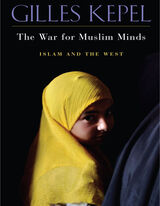
The events of September 11, 2001, forever changed the world as we knew it. In their wake, the quest for international order has prompted a reshuffling of global aims and priorities. In a fresh approach, Gilles Kepel focuses on the Middle East as a nexus of international disorder and decodes the complex language of war, propaganda, and terrorism that holds the region in its thrall.
The breakdown of the Israeli-Palestinian peace process in 2000 was the first turn in a downward spiral of violence and retribution. Meanwhile, a neo-conservative revolution in Washington unsettled U.S. Mideast policy, which traditionally rested on the twin pillars of Israeli security and access to Gulf oil. In Saudi Arabia and Afghanistan, a transformation of the radical Islamist doctrine of Bin Laden and Zawahiri relocated the arena of terrorist action from Muslim lands to the West; Islamist radicals proclaimed jihad against their enemies worldwide.
Kepel examines the impact of global terrorism and the ensuing military operations to stem its tide. He questions the United States' ability to address the Middle East challenge with Cold War rhetoric, while revealing the fault lines in terrorist ideology and tactics. Finally, he proposes the way out of the Middle East quagmire that triangulates the interests of Islamists, the West, and the Arab and Muslim ruling elites. Kepel delineates the conditions for the acceptance of Israel, for the democratization of Islamist and Arab societies, and for winning the minds and hearts of Muslims in the West.

Reports of sexual violence in armed conflict frequently appear in political discussions and news media, presenting a stark contrast to a long history of silence and nonrecognition. Conflict-related sexual violence has transitioned rapidly from a neglected human rights issue to an unambiguous security concern on the agendas of powerful states and the United Nations Security Council. Through interviews and primary-source evidence, Kerry F. Crawford investigates the reasons for this dramatic change and the implications of the securitization of sexual violence.
Views about wartime sexual violence began changing in the 1990s as a result of the conflicts in the former Yugoslavia and Rwanda and then accelerated in the 2000s. Three case studies—the United States' response to sexual violence in the Democratic Republic of Congo, the adoption of UN Security Council Resolution 1820 in 2008, and the development of the United Kingdom’s Preventing Sexual Violence in Conflict Initiative—illustrate that use of the weapon of war frame does not represent pure co-optation by the security sector. Rather, well-placed advocates have used this frame to advance the antisexual violence agenda while simultaneously working to move beyond the frame’s constraints. This book is a groundbreaking account of the transformation of international efforts to end wartime sexual violence.
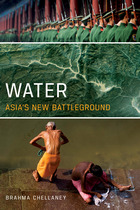
Winner of the Asia Society's Bernard Schwartz 2012 Book Award
The battles of yesterday were fought over land. Those of today are over energy. But the battles of tomorrow may be over water. Nowhere is that danger greater than in water-distressed Asia.
Water stress is set to become Asia’s defining crisis of the twenty-first century, creating obstacles to continued rapid economic growth, stoking interstate tensions over shared resources, exacerbating long-time territorial disputes, and imposing further hardships on the poor. Asia is home to many of the world's great rivers and lakes, but its huge population and exploding economic and agricultural demand for water make it the most water-scarce continent on a per capita basis. Many of Asia’s water sources cross national boundaries, and as less and less water is available, international tensions will rise. The potential for conflict is further underscored by China’s unrivaled global status as the source of transboundary river flows to the largest number of countries, ranging from India and Vietnam to Russia and Kazakhstan; yet a fast-rising China has declined to enter into water-sharing or cooperative treaties with these states, even as it taps the resources of international rivers.
Water: Asia’s New Battleground is a pioneering study of Asia’s murky water politics and the relationships between fresh water, peace, and security. In this unique and highly readable book, Brahma Chellaney expertly paints a larger picture of water across Asia, highlights the security implications of resource-linked territorial disputes, and proposes real strategies to avoid conflict and more equitably share Asia’s water resources.

Does state acquisition of nuclear weapons lead to stability and peace or instability and crises? This is one of the great debates in international relations scholarship. Michael D. Cohen argues that nuclear weapons acquisition often does dangerously embolden the acquiring state to undertake coercion and aggression, but that this behavior moderates over time as leaders learn the dangers and limitations of nuclear coercion. This book examines the historical cases of the Soviet Union and Pakistan in depth and also looks at mini-cases involving the United States, China, and India. This book broadens our understanding of how leaders and states behave when they acquire nuclear weapons and is important reading for scholars and students of international relations, security studies, and political psychology.
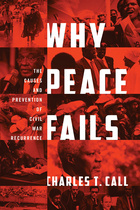
Why does peace fail? More precisely, why do some countries that show every sign of having successfully emerged from civil war fall once again into armed conflict? What explains why peace "sticks" after some wars but not others?
In this illuminating study, Charles T. Call examines the factors behind fifteen cases of civil war recurrence in Africa, Asia, the Caucasus, and Latin America. He argues that widely touted explanations of civil war—such as poverty, conflict over natural resources, and weak states—are far less important than political exclusion. Call’s study shows that inclusion of former opponents in postwar governance plays a decisive role in sustained peace.
Why Peace Fails ultimately suggests that the international community should resist the temptation to prematurely withdraw resources and peacekeepers after a transition from war. Instead, international actors must remain fully engaged with postwar elected governments, ensuring that they make room for former enemies.

Women and Gender Perspectives in the Military compares the integration of women, gender perspectives, and the women, peace, and security agenda into the armed forces of eight countries plus NATO and United Nations peacekeeping operations. This book brings a much-needed crossnational analysis of how militaries have or have not improved gender balance, what has worked and what has not, and who have been the agents for change.
The country cases examined are Sweden, the Netherlands, Canada, the United States, the United Kingdom, Israel, Australia, and South Africa. Despite increased opportunities for women in the militaries of many countries and wider recognition of the value of including gender perspectives to enhance operational effectiveness, progress has encountered roadblocks even nearly twenty years after United Nations Security Council Resolution 1325 kicked off the women, peace, and security agenda. Robert Egnell, Mayesha Alam, and the contributors to this volume conclude that there is no single model for change that can be applied to every country, but the comparative findings reveal many policy-relevant lessons while advancing scholarship about women and gendered perspectives in the military.
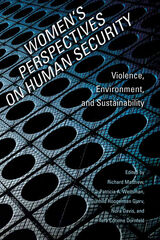

A sobering account of how the United States trapped itself in endless wars—abroad and at home—and what it might do to break free.
Over the past half-century, Americans have watched their country extend its military power to what seemed the very ends of the earth. America’s might is felt on nearly every continent—and even on its own streets. Decades ago, the Wars on Drugs and Terror broke down the walls separating law enforcement from military operations. A World of Enemies tells the story of how an America plagued by fears of waning power and influence embraced foreign and domestic forever wars.
Osamah Khalil argues that the militarization of US domestic and foreign affairs was the product of America’s failure in Vietnam. Unsettled by their inability to prevail in Southeast Asia, US leaders increasingly came to see a host of problems as immune to political solutions. Rather, crime, drugs, and terrorism were enemies spawned in “badlands”—whether the Middle East or stateside inner cities. Characterized as sites of endemic violence, badlands lay beyond the pale of civilization, their ostensibly racially and culturally alien inhabitants best handled by force.
Yet militarized policy has brought few victories. Its failures—in Iraq, Afghanistan, US cities, and increasingly rural and borderland America—have only served to reinforce fears of weakness. It is time, Khalil argues, for a new approach. Instead of managing never-ending conflicts, we need to reinvest in the tools of traditional politics and diplomacy.
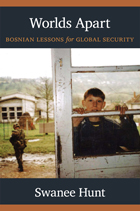
READERS
Browse our collection.
PUBLISHERS
See BiblioVault's publisher services.
STUDENT SERVICES
Files for college accessibility offices.
UChicago Accessibility Resources
home | accessibility | search | about | contact us
BiblioVault ® 2001 - 2024
The University of Chicago Press









